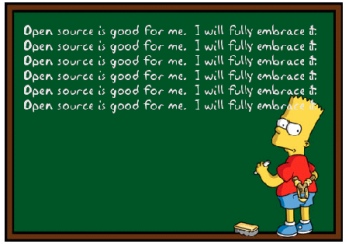 I’m not attempting to get into a flame war with this post. It’s a personal reflection and more of a statement than an argument. Please comment appropriately! 🙂
I’m not attempting to get into a flame war with this post. It’s a personal reflection and more of a statement than an argument. Please comment appropriately! 🙂
In a perfect world, everything I use would be an Open Source product and have been produced using Open principles and philosophies. I’ve been part of a Becta-funded project into the use of Open Source Software (OSS) in schools, spent time with Linux as my sole operating system, and have given away (to anyone who’d have them) CDs and DVDs containing OSS.
But, without consciously aiming to do so, I’ve found myself using less and less Open Source stuff over the last year or so. Why? There’s several reasons.
1. Standards are to innovate upon
The reason that we have ‘standards’ in any area of life is to ensure compliance. But that isn’t meant to limit creativity and innovation, but to serve as a basis upon which it can flourish. Whilst there’s a lot of wonderful work going on in the OSS arena, there’s also a lot of people and projects engaging in catch-up.
2. Willingness to pay for software
When I was younger I had no or very little money. I’m far from rich now, but can nevertheless afford to pay for software that improves my productivity and/or outputs. This means that I’m using iWork instead of OpenOffice.org, for example.
3. Ecosystems and things ‘just working’
I was sorely tempted to purchase an Android-powered mobile phone recently. The main reason I didn’t? It had nothing to do with the specifications of the phone I had in mind. It was to do with access to the iTunes store. I listen to a lot of podcasts but, since moving completely to Spotify for my music, no longer sync my iPhone at all. Whilst I would be able to use software such as DoubleTwist to get content onto an Android-powered phone, it would mean syncing again and no access on-the-move. That, as they say, was a dealbreaker for me.
The other thing about tightly-controlled ecosystems is that, for all the whinging about control, DRM and monopolies they provide a seamless, enjoyable and fairly risk-free experience to the end user. I know, for example, that I’m going to get well-made app in the iPhone app store, and that books are going to be formatted correctly when using the Amazon Kindle store.
Finally, ecosystems mean that things ‘just work’. I continue to use Google’s online offerings because they all work together so well. I can get data in and data out easily, and transfer information between applications quickly. Taking any longer than necessary to do tasks isn’t high on my list of desirable features for any technology with a thesis to write…
4. Too much choice
The mantra of the ‘noughties’, if it had one, would have been ‘choice, choice, choice’. We were given a plethora of television channels, luxury goods and even hospitals to choose from. More choice, it was argued, led to higher standards.
However, the problem with too much choice is that you become paralysed in the process of decision-making. You need some kind of kind or heuristic to apply to the situation. Think about purchasing a laptop. There are so many makes, types, shapes and colours that it would take a great deal of time even to whittle it down to three choices.
The same goes with software. Once I’ve found a reputable and high-quality source of hardware or software, I’m likely to stick with that source unless something disastrous happens. So who do I look for when I’m making hardware purchases? Apple and Sony. Where do I look first for my online apps and software? Google.
5. Free is not OSS
I still use a lot of free software. But much of it is not OSS. There are new models evolving where the end product is made available either temporarily or permanently to users for free. (think of ‘freemium’ models, sponsored apps and the like!)
The fact that it is (usually) free is, like it or not, the biggest selling point of OSS. Whilst I and others completely buy into the philosoph(ies) behind it, with the increasing availability of free (as in beer) software undermines the appeal of OSS.
Conclusion
I am not advocating that people ignore OSS in favour of proprietary products. Far from it. What I am pointing out here is that the landscape is changing and OSS advocates need to change their approach. My recommendations:
- Much more emphasis placed on the ‘four freedoms’
- The building of an OSS ecosystem
- An app store for OSS (seriously)
What do YOU think? Have you been using less or more OSS recently? Why? :-p

 I’m not attempting to get into a flame war with this post. It’s a personal reflection and more of a statement than an argument. Please comment appropriately! 🙂
I’m not attempting to get into a flame war with this post. It’s a personal reflection and more of a statement than an argument. Please comment appropriately! 🙂